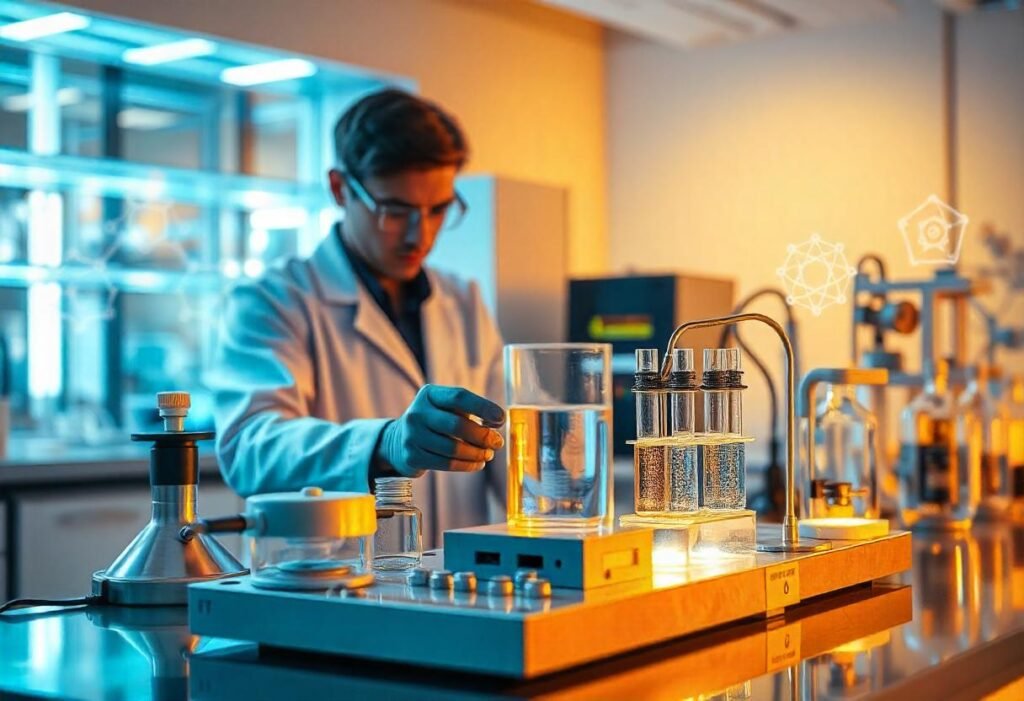Electrochemistry is a fundamental field to assist the development and production of drugs. Researchers can utilize the power of electrochemical that allows them to make the most efficient and precise compounds. But this approach not only hastens the detection of new drugs, it also cuts costs, which ultimately means patients in need have more accessible treatments. Role of electrochemistry lends to greater product quality and consistency during the drug development and manufacturing process and can deliver safer medications to the market faster. Amidst a pharmaceutical industry in continued transition, developments will increase the importance of integrating electrochemical methods to succeed, leading to and unlocking breakthroughs that could change healthcare everywhere.

What Is Electrochemistry?
Electrochemistry is the study of chemical reactions where electrons are moved (reduction oxidation, or redox processes). Electrochemistry is used to design and modify complex molecular structures, key in the design and production of drugs, in the pharmaceutical industry.
Role of Electrochemistry in Drug Development
Drug Discovery
The power of electrochemistry is that it offers controlled molecular transformations. Early stage drug discovery demands this ability; scientists are trying to find candidates in vast chemical spaces.
- Targeted Reactions: Electrochemical methods are uniquely capable of selectively activating functional groups in a molecule, forming structures that are otherwise inaccessible by traditional means.
- Green Chemistry: By using electricity as a clean reagent, without toxic chemicals, this fits into sustainability goals.
API Synthesis
Any drug is constituted of Active Pharmaceutical Ingredients. Electrochemical synthesis offers a scalable and cost-effective way to produce APIs while ensuring high purity and yield.
- Reduction of Byproducts: Worldwide, there are often huge amounts of waste produced by traditional chemical processes. Driven by electron transfer, electrochemistry minimizes by products.
- Precision Engineering: The construction of complex molecules — such as chiral molecules — that are vital to many drugs’ efficacy is enabled with electrochemical techniques.
Green and Sustainable Manufacturing
The pressure is on the pharmaceutical industry to go green. Role of Electrochemistry in this challenge is to offers a route to sustainable manufacturing by reducing energy use and emissions of waste.
- Energy Efficiency: Ambient temperature and pressure electrochemical processes are typically less demanding in energy consumption as compared to thermal or catalytic methods.
- Renewable Integration: In addition, the whole processes can be powered by renewable energy supplies such as wind, minimizing their carbon footprint.

Electrochemical Methods in Pharma: Benefits
Enhanced Selectivity
Molecule activation via electrochemistry was used to selectively activate molecules, reducing the chance of side reactions. Precisely, in drug development this is extremely important, because the purity of compounds may affect the safety and efficacy of drugs.
Cost-Effectiveness
The initial set up for Electrochemical systems may be involved but the long term benefits are huge. Overall economics are the result of lower reagent costs, less waste disposal needs and greater energy efficiency.
Scalability
Modern electrochemical reactors are ideally suited for both laboratory research and industrial production as they have been designed to be scalable. For example, rapid and consistent API manufacturing is possible in the case of continuous flow electrochemical systems.
Environmental Impact
A greener pharmaceutical manufacturing process reduces waste production and does so by minimizing reliance on hazardous chemicals, some of which have been phased out by the courts. It fits with wider efforts in the industry to make it more sustainable.
Challenges and Opportunities
Current Limitations
- Technical Expertise: Special knowledge is required to use the electrodes, restraining their wide use.
- Equipment Costs: Despite being expensive, high quality electrochemical systems have a long term benefit which generally outweigh their initial cost.
Emerging Opportunities
- Automation and AI Integration: Electrochemical systems are getting more user friendly while becoming more and more energy efficient thanks to the advances in technology. The future is in automated platforms coupled with AI driven reaction optimization.
- Expanding Applications: As research progresses, role of electrochemistry will likely grow beyond API synthesis to include drug formulation and advanced material creation.
Case Studies: Real-World Impact
Case Study 1: Sustainable API Production
Only recently has a leading pharmaceutical company utilized electrochemical methods for the production of a chiral API in the widely prescribed medication. The tangible benefit of this approach was demonstrated by this transition, which reduced the process’s waste output by 40 percent and reduced production cost by 25 percent.
Case Study 2: Accelerated Drug Discovery
Electrochemical techniques were used by researchers at a major university to establish a library of new bacteria-killing compounds that could work against antibiotic resistant bacteria. These methods enabled a time acceleration of the discovery process resulting in promising therapeutic candidates.
The Future of Electrochemistry in Pharmaceuticals
Role of Electrochemistry is even more important to play in the future of pharmaceuticals. This makes electrochemical methods likely to be the norm as the industry moves towards sustainability and efficiency. Electro-organic synthesis and integrated electrochemical platforms promise to materially augment and expand the limits of what is possible in drug development.
Conclusion
Modern drug development and manufacturing is truly being revolutionized through the medium of electrochemistry. It addresses many of the challenges the pharmaceutical industry is currently battling by enabling precise, cost effective and environmentally friendly processes. Electrochemical methods adopted by companies are increasing the scientific capabilities of companies and helping to create a more sustainable future.

